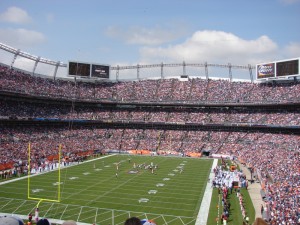It’s hard to sympathize with Sen. John McCain these days, given his eagerness to get the U.S. involved in yet another Mideast war, this one in Syria.
But even though the Arizona Republican has stayed too long at the fair, he can still turn up an intriguing idea on occasion. Recently, for instance, he has been pushing the Congress and Federal Communications Commission to change the “blackout” rule governing the televising of National Football League games.
The rule, promulgated in 1975, prohibits cable and satellite providers from carrying a game nationally if it has been blacked out on local television. Two years earlier, Congress had voted to mandate local TV broadcasts if the stadium had sold out 72 hours before kickoff.
McCain thinks the blackout law is outrageous — at least as it applies to teams playing in publicly financed stadiums.
![]() “If that stadium is not taxpayer-financed, then the owners can do anything they want to,” McCain told a Senate subcommittee in May. “But if the taxpayers paid for them, then by God I think the taxpayers ought to be able to see the game whether they sell out the stadium or not.”
“If that stadium is not taxpayer-financed, then the owners can do anything they want to,” McCain told a Senate subcommittee in May. “But if the taxpayers paid for them, then by God I think the taxpayers ought to be able to see the game whether they sell out the stadium or not.”
I know, I know. It’s not the federal government’s business to tell the NFL how to run its affairs, but it’s too late for that. A 1961 antitrust law allows the NFL to negotiate exclusively on behalf of its teams for billions of dollars worth of TV contracts.
Any move that might discourage the never-ending lust of NFL owners to stick taxpayers with their capital costs is probably a good one. Team owners are the nation’s premier corporate welfare queens.
Broncos owner Pat Bowlen is among those who know how to play the citizens. Metro area voters agreed in 1998 to a 0.1 percent sales tax so that the Broncos could build a new facility to replace Mile High Stadium. Taxpayers paid 75 percent of the $360 million projected cost, with the Broncos paying the rest. The team also got almost all the revenue, including from the dozens of expensive skyboxes that the old stadium didn’t have.
The tax was in effect a continuation of the same 0.1 percent levy used earlier to finance the construction of Coors Field for the Colorado Rockies.
Sports teams have been picking the public purse for years, often by threatening to move the team if voters didn’t go along with a proposed tax.
You don’t have to build a football stadium with public funds. New England Patriots owner Robert Kraft managed to finance the new Gillette Stadium privately about the same time the Broncos were calling upon the taxpayers.
On the baseball side, the San Francisco Giants built Pacific Bell Park (now AT&T Park) privately in 2000, the first private baseball facility since Dodger Stadium was built in LosAngeles in 1962. Of course the early stadiums, like Chicago’s Wrigley Field and Boston’s Fenway Park, were built with private funds.
Paying for their own park can’t have hurt the Giants financially; they’ve won the World Series in two of the past three years.

The number of NFL blackouts has been small in recent years. In 2012, for instance, of 256 regular-season games, all but 15 were telecast in their home markets. Only five franchises were affected: Tampa Bay blacked out 6, San Diego 4, Cincinnati 2. Buffalo 2 and Oakland 1. Denver has never had a local blackout since the rule was adapted; the Broncos manage to keep a long waiting list for season tickets.
But in 1976, NFL blackouts became an issue in a Denver election, when Republican Don Friedman was trying to unseat Congresswoman Pat Schroeder. The Rocky Mountain News discovered that Allan and Gerald Phipps, then owners of the Broncos, were soliciting funds for Friedman from their fellow NFL owners because, they said, Friedman would vote to get rid of the blackout law and let the league determine its own TV policy.
Friedman confirmed his stand, saying that he didn’t believe that professional football is the government’s business.
He may have been right, but it wasn’t a popular stand in the 1st Congressional District. Voters re-elected Schroeder as usual, though Friedman came closer than her other challengers before and after.
There’s nothing wrong with athletes making a lot of money in professional sports, but the fact that the owners can turn over much of their capital costs to taxpayers makes the salaries higher than they might be in an unsubsidized world.
Teams or stadium districts can help finance construction costs by selling naming rights to corporate sponsors. That is the case with Sports Authority (formerly Invesco) Field at Mile High.
But that’s not the case at Coors Field. The stadium district board was supposed to sell the naming rights to whomever kicked in the most toward construction costs. The law said 50 percent of the construction costs (lowballed to be $139 million) was to come from private sources.
Seven months after voters approved the tax in 1990, the district board shifted the power to sell the naming rights to the Rockies ownership group. It in turn sold the rights to Coors Brewing Co., as expected. But Coors didn’t use its cash to build the ballpark. Instead its money was needed to buy the franchise. Some of the original investors, it seemed, were in trouble with the law and couldn’t pass Major League Baseball’s smell test. They had to back out. Coors purchased an equity stake in the team with its money and still got to put its name on what should be called Taxpayers Field.


